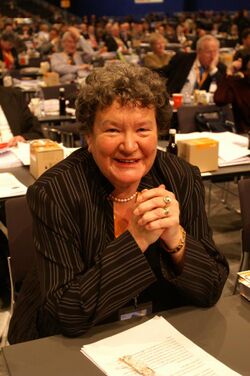
| Version | Summary | Created by | Modification | Content Size | Created at | Operation |
|---|---|---|---|---|---|---|
| 1 | Catherine Yang | -- | 646 | 2022-11-10 01:43:23 | | | |
| 2 | Catherine Yang | Meta information modification | 626 | 2022-11-15 01:56:47 | | |
Video Upload Options
1. Introduction
Dagmar Elisabeth Schipanski (born 3 September 1943) is a German physicist, academic, and politician from the State of Thuringia. Best known for 1999 nomination as President of Germany by the conservative Christian Democratic Union (CDU) and its sister party, the Christian Social Union of Bavaria (CSU), Schipanski has held a variety of political and academic roles her during four-decade-long career and has been awarded with numerous honors, most notably the Order of Merit of the Federal Republic of Germany in 1996.
2. Early Life
Schipanski was born in Sättelstädt, Thuringia, that later became a part of the German Democratic Republic, in 1943. After graduating from high school in 1962, she became a student of applied physics at the Technical University of Magdeburg. In 1967, Schipanski began her career as an engineer, followed by a period working as an assistant at TU Ilmenau. After earning her doctorate in 1976, Schipanski began her academic career as a lecturer in Ilmenau and, starting in 1990, as a professor. She served as Dean of the Faculty of Electrical Engineering and Information Technology at TU Ilmenau from 1992 to 1993, and as Rector of TU Ilmenau 1995 to 1996.
From 1996 to 1998, Schipanski served as chair of the German Council of Science and Humanities, an advisory body that makes recommendations on the development of science and research to both the federal government and the state governments of Germany. She was elected to the Leopoldina,[1] the national academy of Germany, in 1998, and has served as a member of the Academia Europaea.[2]
3. Political Career
Despite not being a member of either party, Schipanski was nominated by the CDU and the CSU to be their candidate in the 1999 Presidential election. Schipanski lost the election to former Minister-President of North-Rhine Westphalia Johannes Rau, a member of the Social Democratic Party, receiving 572 votes to Rau's 690 on the second ballot.[3]
After her defeat, Schipanski remained active in politics, and was appointed Minister of Science, Research and the Arts in the cabinet of Thuringia Minister-President, Bernhard Vogel, later that year. Schipanski would later join the CDU in 1999 and would remain in her ministerial position until 2004, when she was elected to the Landtag of Thuringia and became President of the Landtag. Schipanski lost her position in the Landtag as a result of the 2009 state election, which produced a poor result for the governing CDU.
4. Personal Life
Schipanski, a Protestant, is married and has three children. One of her children, Tankred Schipanski, has been a member of the Bundestag since 2009.
5. Memberships
Since 1998, Schipanski has been a member of the board of directors of the MDR. From 1998 to 2003, she served as a member of the UNESCO World Commission on Ethics in Science and Technology. From 2000 to 2009, Schipanski served as President of the German Cancer Aid. She has served as a member of the board of trustees of the German Foundation for Monument Protection since 2000, as chair of the board of the Lennart Bernadotte Foundation since 2003, and, since 2005, as the chair of the board of trustees of the Fraunhofer Institute for Digital Media Technology.
Schipanski is an ambassador for the New Social Market Economy initiative and has served as a member of the presidium of the Oskar Patzelt Foundation. She temporarily served as a member of the board of trustees of the Körber Foundation[4] before leaving her post due to pressure from anti-tobacco activists.[5] Since 2008, Schipanski has served as a member of the board of trustees of the International Martin Luther Foundation.[6]
References
- "Mitgliederverzeichnis". https://www.leopoldina.org/de/mitglieder/mitgliederverzeichnis/member/639/.
- "Mitgliederverzeichnis: Dagmar Schipanski". Academia Europaea. http://www.ae-info.org/ae/Member/Schipanski_Dagmar.
- Eine Dokumentation aus Anlass der Wahl des Bundespräsidenten am 18. März 2012
- "Fr. Prof. Dr.-Ing. habil. Dagmar Schipanski". http://www.dagmar-schipanski.de/.
- "Schipanski raucht nicht". Die Tageszeitung: Taz: pp. 22. 29 July 2005. http://www.taz.de/!569035/.
- "Internationale Martin Luther Stiftung". http://www.luther-stiftung.org/index.php?id=67&L=-1.

Location: Thuringia, Germany




